Nigeria’s Political Icons: Awolowo, Bello, Azikiwe, Abacha, and Gowon
Chief Obafemi Awolowo (1909–1987) was a prominent Nigerian statesman, nationalist, and political leader. He played a crucial role in Nigeria’s pre-independence and post-independence politics and is often regarded as one of the founding fathers of the nation. Here are key points about Obafemi Awolowo:
- Early Life and Education:
- Obafemi Awolowo was born on March 6, 1909, in Ikenne, Western Nigeria.
- He received his early education at Baptist Boys’ High School in Abeokuta and later studied commerce at the University of London.
- Political Activism:
- Awolowo became politically active during the nationalist movements of the 1940s. He joined the Nigerian Youth Movement (NYM) and later the Action Group (AG), a political party formed in the 1950s.
- Regional Politics:
- In the First Republic (1960–1966), Awolowo served as the Premier of the Western Region, one of Nigeria’s three regions at the time.
- His administration implemented various policies and programs, including free education, healthcare, and infrastructure development.
- Role in Independence:
- Awolowo was a key figure in the negotiations for Nigeria’s independence. He was a delegate to the Lancaster House Constitutional Conference in London in 1957.
- Federal Politics:
- After the collapse of the First Republic following a military coup in 1966, Awolowo played a prominent role in federal politics. He served as the Vice Chairman of the Federal Executive Council under General Yakubu Gowon.
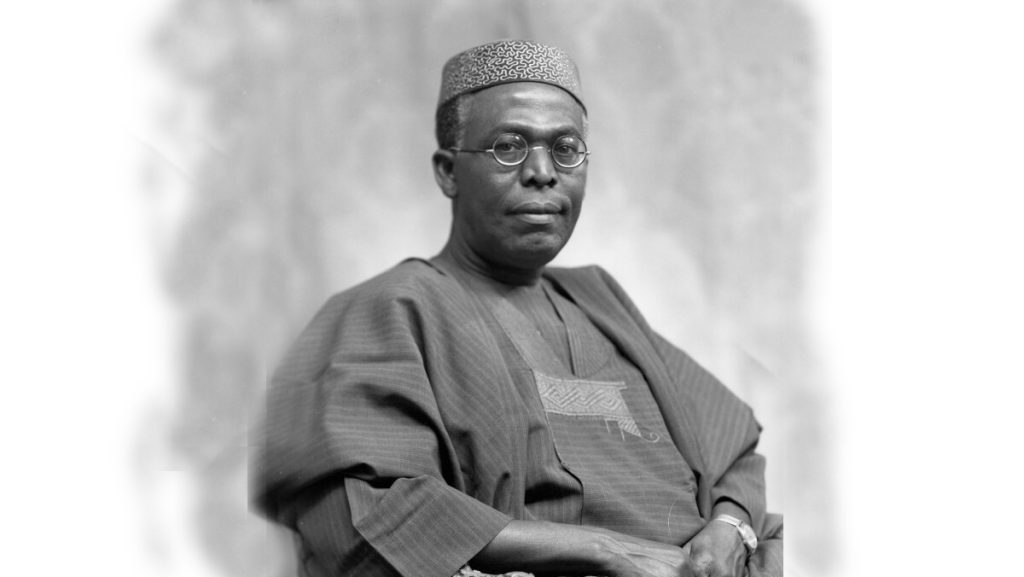
- Civil War and Prisons:
- Awolowo was a prominent figure during the Nigerian Civil War (1967–1970). He was appointed as the Commissioner for Finance and Economic Planning in the Federal Military Government.
- Following the end of the civil war, he was accused of conspiring to overthrow the government and was subsequently imprisoned for three years.
- Return to Politics:
- Awolowo returned to active politics after his release from prison. He contested the 1979 presidential election under the Unity Party of Nigeria (UPN) but was not successful.
- Death and Legacy:
- Obafemi Awolowo passed away on May 9, 1987, at the age of 78.
- He is remembered for his contributions to education, economic development, and regional governance. His free education policy in the Western Region had a lasting impact on education in Nigeria.
- The Obafemi Awolowo University in Ile-Ife, Nigeria, was named in his honor.
- Ideological Contributions:
- Awolowo was known for his political philosophy known as “African Socialism” or “welfarism,” which emphasized the role of the state in providing social welfare programs to uplift the masses.
Obafemi Awolowo’s legacy is celebrated as a symbol of principled leadership, advocacy for education, and contributions to Nigeria’s political and economic development. His ideas and impact on governance continue to influence political discourse in Nigeria.
Sir Ahmadu Bello: Early life, political career, and independence contribution
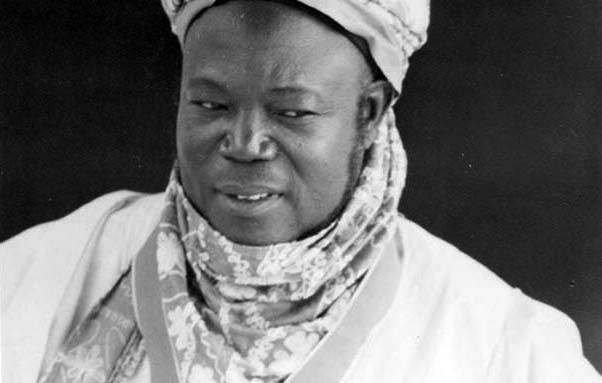
Sir Ahmadu Bello (1909–1966) was a prominent Nigerian political leader, aristocrat, and the Sardauna of Sokoto. He played a significant role in Nigerian politics, particularly in the Northern region, and was a key figure in the struggle for independence. Here are key points about Ahmadu Bello:
- Early Life and Education:
- Ahmadu Bello was born on June 12, 1909, in Rabbah, Sokoto Caliphate, which is now part of present-day Nigeria.
- He received his early education in Islamic studies and later attended Katsina Teacher Training College and the University of London.
- Leadership in Northern Nigeria:
- Bello was appointed the Sardauna of Sokoto, a traditional and political title, in 1938. This position made him a central figure in the Northern People’s Congress (NPC), a political party in Northern Nigeria.
- Political Career:
- Bello’s political career gained momentum as he rose through the ranks. He became the Premier of the Northern Region in 1954, a position he held until his death in 1966.
- As Premier, he focused on development projects, education, and infrastructure in the Northern region.
- Advocacy for Northern Interests:
- Bello was known for his advocacy for Northern interests within the context of a united Nigeria. He sought to protect the cultural and religious identity of the Northern region while working towards national unity.
- Role in Independence:
- Ahmadu Bello played a key role in the negotiations for Nigeria’s independence. He was one of the signatories to the 1960 Independence Constitution that granted Nigeria self-rule.
- Ethnic Relations and National Unity:
- Bello worked to maintain peaceful relations among Nigeria’s diverse ethnic groups. He advocated for a federal system that recognized the autonomy of different regions while fostering national unity.
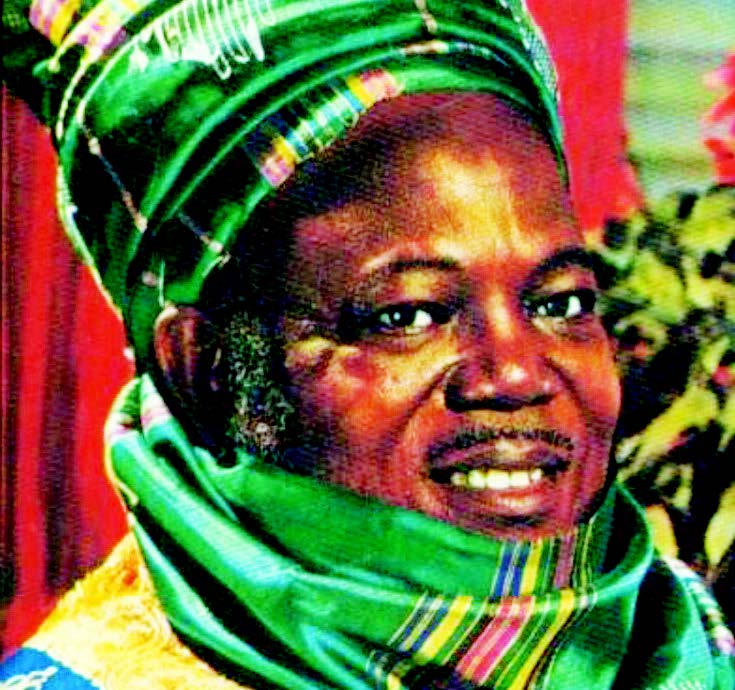
- Assassination:
- On January 15, 1966, Ahmadu Bello, along with other political leaders, was assassinated during a military coup. The coup marked a turning point in Nigerian history and had significant repercussions for the country’s political landscape.
- Legacy:
- Ahmadu Bello is remembered as a key figure in Nigeria’s pre-independence and early post-independence history. His contributions to education, regional development, and advocacy for Northern interests have left a lasting impact.
- The Ahmadu Bello University (ABU) in Zaria, Nigeria, was named in his honor. The university is one of the largest and oldest degree-awarding institutions in Nigeria.
Ahmadu Bello’s legacy continues to be remembered and celebrated in Nigeria, particularly in the Northern region, where his influence and impact on development and politics are still acknowledged.
Nnamdi Azikiwe: Father of Nigerian nationalism and his achievements
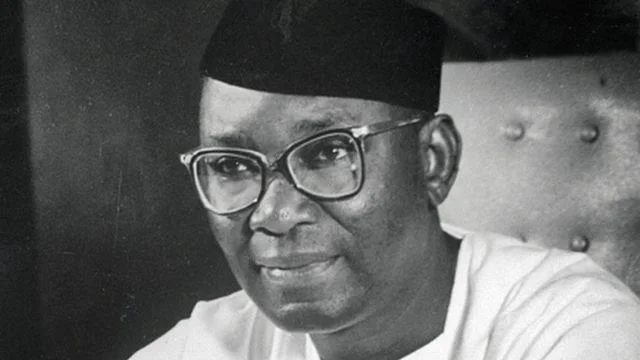
Nnamdi Azikiwe, often referred to as “Zik,” was a Nigerian statesman, politician, and the first President of Nigeria. He played a crucial role in Nigeria’s struggle for independence and made significant contributions to the country’s political development. Here are key points about Nnamdi Azikiwe:
- Early Life and Education:
- Nnamdi Azikiwe was born on November 16, 1904, in Zungeru, Northern Nigeria, during the British colonial era.
- He received his early education in Nigeria and later studied in the United States, where he attended several universities, including Howard University.
- Journalism Career:
- Azikiwe began his career in journalism and became an influential figure in African journalism during the 1930s and 1940s.
- He founded and edited several newspapers, including the West African Pilot, which played a significant role in mobilizing public opinion against colonial rule.
- Political Activism:
- Azikiwe was a vocal advocate for Nigerian nationalism and independence. He was involved in political activism and played a key role in the formation of political parties.
- He was a co-founder of the National Council of Nigeria and the Cameroons (NCNC) in 1944, a political party that aimed to represent the interests of Nigerians across ethnic and regional lines.
- Independence Struggle:
- Azikiwe was a prominent figure in the negotiations leading to Nigeria’s independence from British rule. He served as the Premier of the Eastern Region from 1954 to 1959.
- Nigeria gained independence on October 1, 1960, and Azikiwe became the country’s first indigenous Governor-General and later the first President in 1963 when Nigeria became a republic.
- Ceremonial President and Transition to Civilian Rule:
- Azikiwe served as the ceremonial President of Nigeria from 1963 to 1966. During this period, political power was concentrated in the office of the Prime Minister.
- He played a role in the transition to civilian rule and democracy in Nigeria.
- Post-Presidency and Later Years:
- After leaving the presidency in 1966, Azikiwe continued to be active in Nigerian politics.
- He held various diplomatic and academic positions, including serving as the Chancellor of the University of Lagos.
- Nnamdi Azikiwe passed away on May 11, 1996, at the age of 91.
- Legacy:
- Nnamdi Azikiwe is often referred to as the “father of Nigerian nationalism.” His contributions to journalism, political activism, and leadership played a pivotal role in shaping the trajectory of Nigeria’s history.
- He is remembered as a key figure in the struggle for independence, a proponent of Pan-Africanism, and one of Nigeria’s founding fathers.
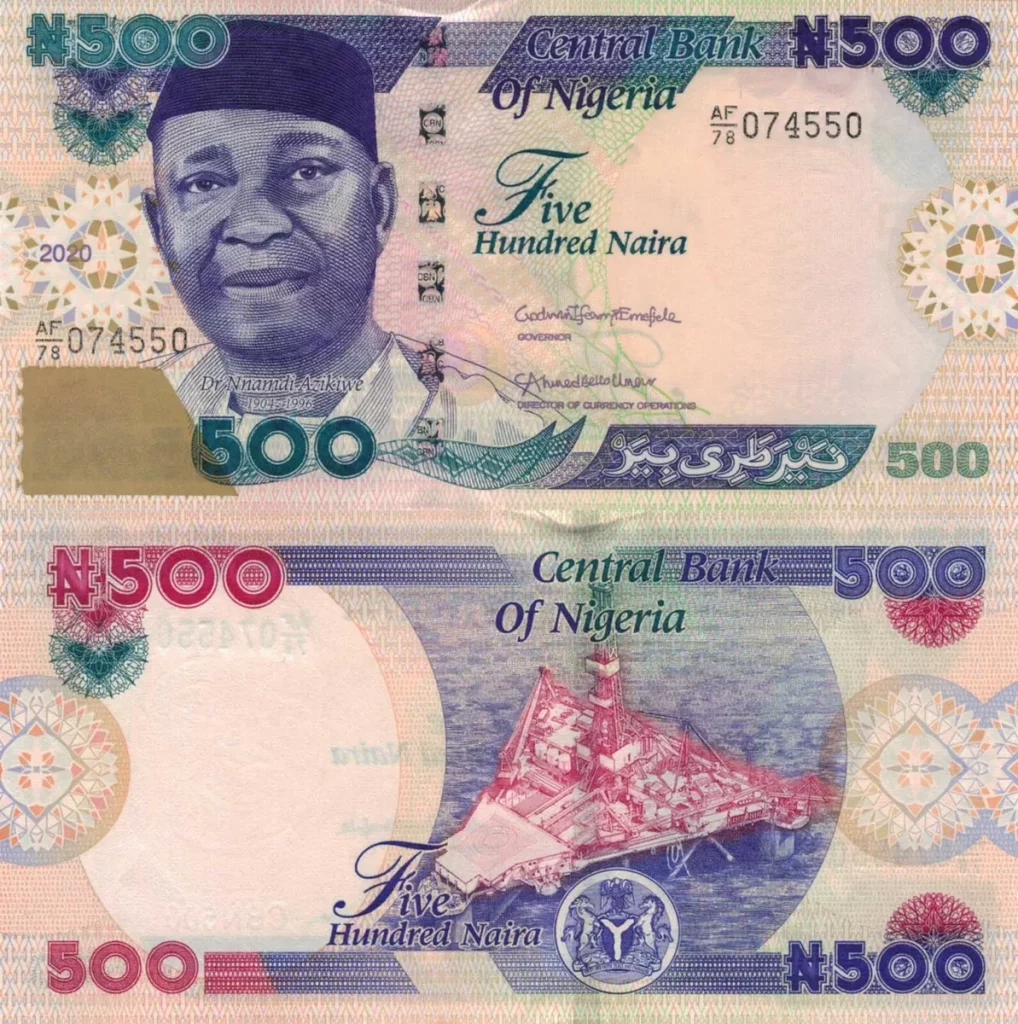
Nnamdi Azikiwe’s legacy extends beyond his political achievements; he remains a symbol of Nigeria’s fight for self-determination and unity during a crucial period in the nation’s history.
Generals Sani Abacha Controversies
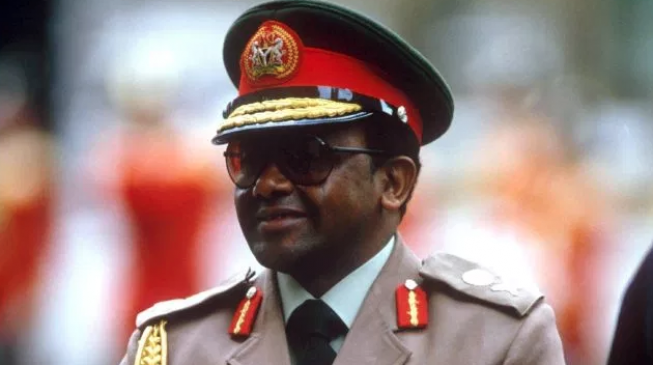
General Sani Abacha (1943–1998) was a Nigerian military officer who served as the country’s de facto head of state from 1993 until his death in 1998. His rule was marked by controversial actions, including allegations of human rights abuses, corruption, and political repression. Here are some key points about General Sani Abacha:
- Military Career:
- Abacha joined the Nigerian Military Training College in 1962 and gradually rose through the ranks over the years.
- He played a significant role in the military coups of 1983 and 1985, which brought General Muhammadu Buhari to power.
- Seizure of Power:
- Abacha seized power in Nigeria through a coup on November 17, 1993, overthrowing the Interim National Government led by Chief Ernest Shonekan.
- Rulership:
- Abacha assumed the position of Nigeria’s Head of State and held both the military and political power. His regime was characterized by authoritarian rule, with a disregard for human rights and democratic institutions.
- He dissolved political parties, suspended the constitution, and ruled by decree.
- Alleged Human Rights Abuses:
- Abacha’s regime was accused of widespread human rights abuses, including political repression, suppression of dissent, and the silencing of opposition figures.
- There were reports of extrajudicial killings, torture, and harassment of political opponents.
- Corruption and Looting:
- One of the most notorious aspects of Abacha’s rule was the alleged looting of Nigeria’s treasury. He was accused of embezzling billions of dollars, diverting public funds for personal gain, and engaging in large-scale corruption.
- Family:
- General Sani Abacha was married to Maryam Abacha, and they had several children together.
- Death:
- Abacha died suddenly on June 8, 1998, under controversial circumstances. The official cause of death was listed as a heart attack, but there have been persistent suspicions of foul play.
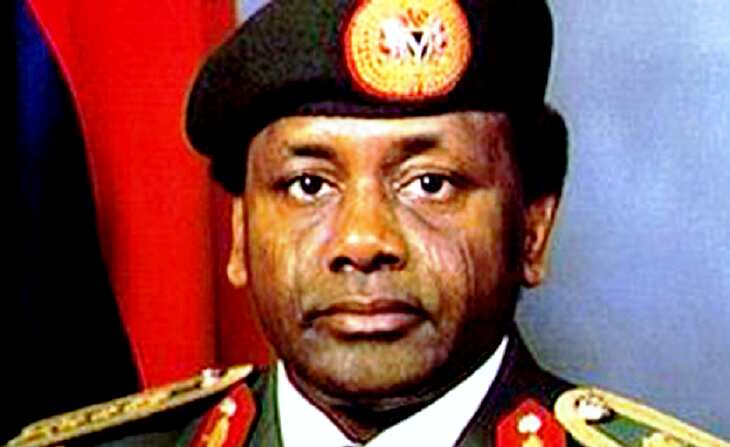
- Legacy and Controversies:
- General Sani Abacha’s legacy is one of controversy, marked by allegations of corruption, human rights abuses, and the erosion of democratic institutions.
- His rule is often considered one of the darkest periods in Nigeria’s recent history, with lasting impacts on the country’s political landscape.
- Assets Recovery:
- After his death, efforts were made to recover funds believed to have been looted by Abacha and his associates. Some of these funds have been repatriated to Nigeria over the years.
While General Sani Abacha’s regime was characterized by claims of achievements in economic stabilization, his legacy is largely overshadowed by allegations of corruption, human rights abuses, and the erosion of democratic values during his rule. The controversies surrounding his leadership continue to shape discussions about governance and accountability in Nigeria.
General Yakubu Gowon
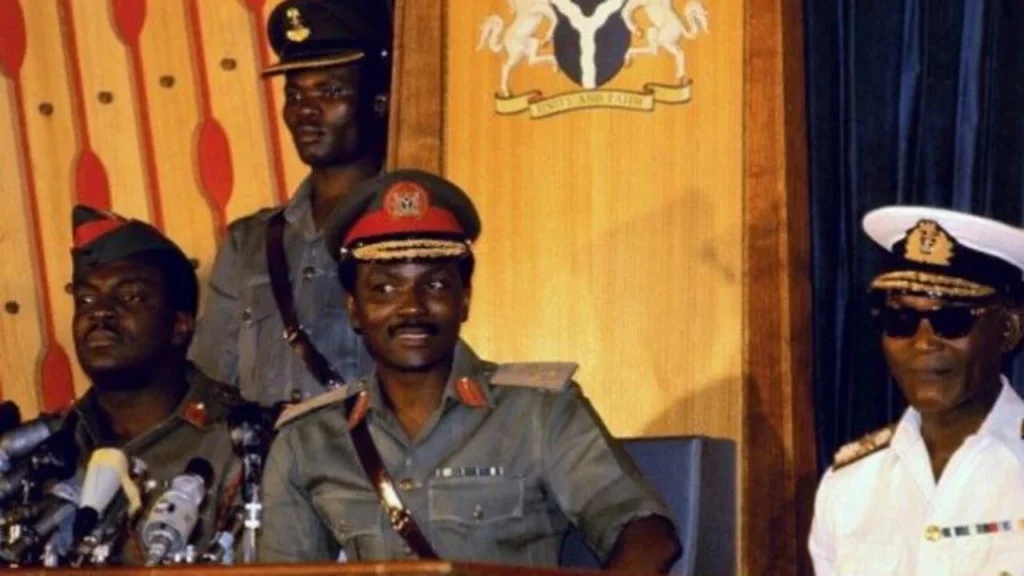
General Yakubu Gowon is a Nigerian military officer who served as the head of state of Nigeria from 1966 to 1975. Here are some key points about General Yakubu Gowon:
- Early Life and Military Career:
- Yakubu Gowon was born on October 19, 1934, in Pankshin, Plateau State, Nigeria.
- He joined the Nigerian Army in 1954 and rose through the ranks over the years.
- Role in the Nigerian Civil War:
- Gowon became the head of state of Nigeria in August 1966 following a military coup. He was only 32 years old at the time, making him one of the youngest leaders in Nigerian history.
- His tenure was marked by the Nigerian Civil War (also known as the Biafran War) that took place from 1967 to 1970. The conflict arose due to political, ethnic, and economic tensions, and Gowon led the federal government’s efforts to reunify the country.
- “No Victor, No Vanquished”:
- Gowon adopted a policy of reconciliation after the civil war, famously declaring a “No Victor, No Vanquished” approach. The goal was to promote national unity and healing.
- Creation of States:
- During his regime, Nigeria was reorganized into 12 states, a move aimed at addressing regional imbalances and fostering a sense of inclusivity.
- 3Rs: Reconstruction, Rehabilitation, and Reconciliation:
- Gowon initiated the “3Rs” program to address the challenges of post-war reconstruction, rehabilitation, and reconciliation. The program aimed to rebuild the war-torn regions and reintegrate former Biafran soldiers and civilians into national life
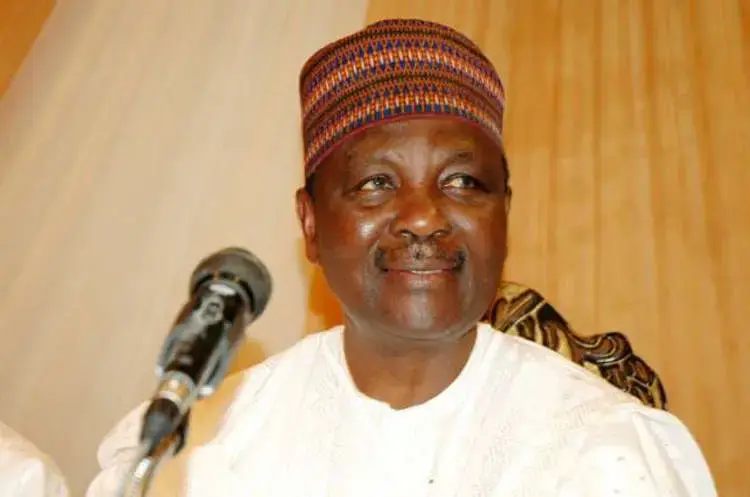
- Economic Policies:
- Gowon’s administration implemented economic policies, including the indigenization decree, which sought to increase Nigerian ownership of businesses and reduce foreign control.
- Overthrown in a Coup:
- Gowon’s government was overthrown in a bloodless coup on July 29, 1975, while he was attending an OAU summit in Kampala, Uganda. Lieutenant Colonel Murtala Ramat Muhammed became the new head of state.
- Life in Exile and Later Return:
- After being overthrown, Gowon went into exile. He later returned to Nigeria in 1981, and he has since been involved in various peace and reconciliation initiatives.
- Post-Retirement Involvement:
- General Yakubu Gowon has been involved in several international and national initiatives, including efforts to promote peace, conflict resolution, and good governance.
- Legacy:
- Yakubu Gowon is often remembered for his role in steering Nigeria through a challenging period, especially during the civil war. His emphasis on national reconciliation and unity has left a lasting impact on the country’s history.
General Yakubu Gowon’s leadership during a critical period in Nigeria’s history, particularly the civil war, and his subsequent contributions to peace and reconciliation have shaped his legacy in the nation’s narrative.
Related Reading Former President Muhammadu Buhari and Olusegun Obasanjo – Background, Political Career and an Overview of their Rule for 8years

